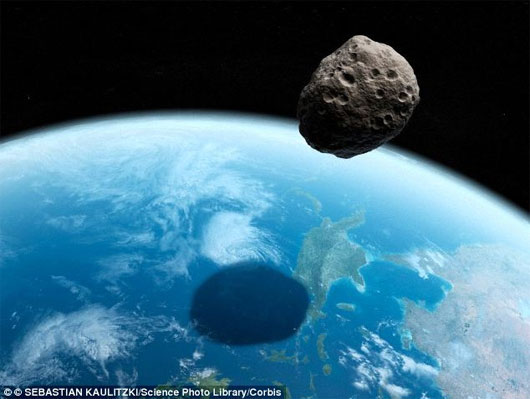Meteorites about the size of 3 buses are about to fly over Earth
Tonight (March 5), an asteroid the size of three double-decker buses will fly extremely close to the Earth at a distance closer to the Moon.
At 21h07 on March 5 (international time), meteorite 2014 DX110 of 30m in size will fly over Earth at a distance of less than 350,000km, equal to 0.9 distance from our planet to the Moon . Scientists say the meteorite is not capable of colliding with the Earth, people can clearly observe meteorites with a good telescope.

Meteorite 2014 DX110 of Apollo class, including orbiting meteorites that fly over Earth. There are about 240 Apollo class meteorites discovered, but scientists believe there are at least 2000 meteorites with a diameter of more than 1km flying through the Earth.
If collided with Earth, the Apollo class meteorite will create a large hole on the ground with a diameter of 10-20 times its size.
The online telescope project and the Slooh website will stream live on the network of meteorites 2014 DX110 flying over Earth. Direct transmission time is expected to start at 20:30 on March 5 (international time).
Last month, the Slooh website also streamed the 2000 EM26 meteorite that flew over Earth. The event had thousands of people waking up night to watch in the hope that a giant meteorite could be seen. But in the end it was just a small meteorite.
- More than half of public buses will become electric buses in 2025
- Video: Sweden launches the first self-propelled bus model
- The surface of the 'giant' meteorite landed on Earth
- A meteorite in Russia just flew over Earth
- Huge meteorites will graze the Earth
- Next month, a meteorite approached the earth
- Two meteorites fly close to the earth today
- What will happen if the Earth ... is twice as big as it is today?
- Video simulating the meteorite scene hit the globe
- The explosion caused meteorites to pass through the sky in the United States, suspected of causing earthquakes
- How does the bus in the river work?
- Meteors are hard to destroy the earth
 Van Allen's belt and evidence that the Apollo 11 mission to the Moon was myth
Van Allen's belt and evidence that the Apollo 11 mission to the Moon was myth The levels of civilization in the universe (Kardashev scale)
The levels of civilization in the universe (Kardashev scale) Today Mars, the sun and the Earth are aligned
Today Mars, the sun and the Earth are aligned The Amazon owner announced a secret plan to build a space base for thousands of people
The Amazon owner announced a secret plan to build a space base for thousands of people